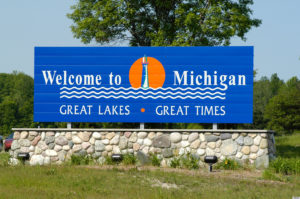Michigan iGaming Bill Will Require Providers Offer Online Poker

AJ7400 Welcome to Michigan Sign at State Border
Just when you thought that online poker regulation had come to a screeching halt in the United States for 2017, Michigan comes up with another bill. On Monday, Michigan Rep. Brandt Iden filed H 4926. This bill seeks to regulate online gambling in general, not just online poker.
Online Poker Must Be Offered
An interesting requirement for the bill is that anyone licensed to offer online gambling services must offer online poker. This is a unique requirement for an iGaming bill. Delaware and New Jersey regulated general iGaming but left the option up to providers as to what they could offer. Nevada’s iGaming bill only makes online poker legal.
The positive side of this requirement is that players will be able to play online poker at any provider. The downside is that online poker could be a loss leader for some providers similar to what poker rooms are at some live casinos.
Reasonable Licensing Fees and Tax Rate
The new House bill includes all details regarding licensing fees and tax rates. Compared to other states, Michigan offers an attractive licensing model.
For starters, the application fee for operators is just $100,000. Once approved, operators will receive a five-year license. They will pay $200,000 for the first year and $100,000 for the remaining years of the license.
This means that an operator will pay just $700,000 to receive a five-year license in Michigan. Considering that some states want to charge $1 million just to apply, Michigan will be very attractive to many potential providers.
Platform provider licenses are also competitively priced. They will pay a $50,000 application fee and $100,000 when the license is issued. Afterwards, they will pay $50,000 a year for the remainder of their five-year license. That’s a total cost of $350,000 for a platform provider to get started in Michigan.
Vendors get the biggest break in terms of fees. Vendors just pay $5,000 upfront and then $2,500 a year for the remainder of their five-year license. At just $15,000 to enter the state, we could see a rush on vendor licenses in the state.
Tax rates for iGaming are reasonable for Michigan. Online casinos will pay a 15% tax rate. However, that rate may be lowered if the state enters into a compact or amends an existing tribal compact.
Will The Bill Work for Michigan Tribes?
One issue with previously submitted iGaming bills is that they required Michigan tribes to waive their sovereign immunity in regards to online gambling. Tribes would not go for such a requirement.
H 4926 does not require tribes to waive sovereignty. Rather, tribes may apply for an internet gaming license if they have entered into a compact with the state under the Indian Gaming Regulatory Act.
In other words, the tribes can simply negotiate a compact with the state in order to get a license. While it is unclear whether this is an amicable solution for Michigan tribes, it does seem to be a fair one and one that could benefit all parties.
What’s Next for the Bill?
We will find out fairly quickly whether this bill has legs as the House Regulatory Reform Committee is scheduled to meet about the bill on Wednesday. The Senate version of the bill has had difficulty moving forward in part to the language surrounding Indian licensing.
Even if the bill moves forward, Michigan is a long way from offering online poker. Should the bill pass, state regulators have up to a year to come up with rules and regulations for iGaming. Afterwards, the licensing process begins.
A generous estimate of when Michigan will start taking bets online would be 2019. Of course, this is all speculation but we hope to have a clearer picture later in the week.
